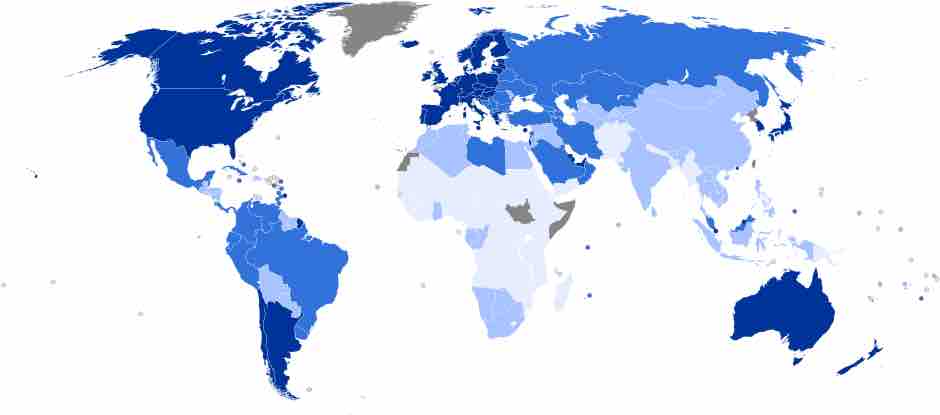An industrialized country, also commonly referred to as a developed country, is a sovereign state with a highly developed economy relative to other nations. Most commonly, the criteria used to evaluate a country's level of development is its gross domestic product (GDP) per capita. However, many other variables are frequently taken into account. Factors used to measure a country's development can include: per capita income, level of industrialization, extent of infrastructure, life expectancy, literacy rate, and general standard of living. The criteria to use and the countries to classify as developed are contentious issues, as discussed below.
Characteristics of Industrialized Countries
In terms of global stratification, industrialized countries are at the top of the global hierarchy. Developed countries, which include such nations as the United States, France, and Japan, have higher GDPs, per-capita incomes, levels of industrialization, breadth of infrastructure, and general standards of living than less developed nations. Consequently, people living in developed countries have greater access to such resources as food, education, roads, and electricity than their counterparts in less developed nations.
Human Development Index
One measure of a nation's level of development is the Human Development Index (HDI), a statistical measure developed by the United Nations that gauges a country's level of development. Often, national income or gross domestic product (GDP) are used alone to measure how prosperous a nation's economy is. HDI considers these factors, but also accounts for how income is invested in healthcare, education, and other infrastructure. Thus, HDI is often used to predict trends in a nation's development.

United Nations Human Development Index (HDI) Rankings for 2011
Human Development Index (HDI) is a measure of how much of a nation's wealth is invested into local services such as education and infrastructure. Countries with low HDI tend to be caught in a national cycle of poverty -- they have little wealth to invest, but the lack of investment perpetuates their poverty. This map shows how disparate HDIs are around the world. Because nations have varying levels of wealth, income, and investment in infrastructure, individual populations experience inequality.
Criticisms
The Human Development Index, along with the entire concept of "developing" and "developed" countries, has been criticized on a number of grounds. The term "developing" implies inferiority compared to a developed country, and it also assumes a desire to develop along the traditional Western model of economic development. Critics argue that this is a rather Western-centric perspective. Critics also argue that it does take into account any ecological considerations and focuses almost exclusively on national performance and ranking.